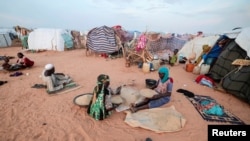The World Food Program is calling for immediate, unimpeded and safe access to conflict-hit areas of Sudan to provide food to millions of displaced people facing acute hunger, amid warnings that this “forgotten war” has potential implications for regional stability.
“This conflict cannot be forgotten. The people of Sudan are not invisible. This conflict has wide-reaching implications, especially as we have seen 1.7 million people flee to neighboring countries like Chad, South Sudan, Egypt and Ethiopia,” WFP Sudan spokesperson Leni Kinzli said Friday.
Speaking in the Kenyan capital, Nairobi, Kinzli urged the international community to “wake up” to the threats posed by the escalating conflict in Sudan and its potential for destabilizing the East Africa region. She said it must act “before this crisis spins further out of control.”
The World Food Program, or WFP, says more than nine months of conflict has exacted an unimaginable toll on civilians. It calls the situation beyond dire, noting that almost 18 million people are facing acute hunger.
Despite herculean efforts, the WFP said it has managed to provide food assistance to only 6.5 million people across the country since April 15. That is when a power grab between two rival generals of the Sudanese Armed Forces and paramilitary Rapid Support Forces plunged the country into war.
Kinzli noted the WFP repeatedly has warned of a looming hunger catastrophe. She said millions of civilians trapped in conflict zones must receive aid immediately to prevent Sudan’s hunger crisis from becoming a hunger catastrophe.
“Shockingly, the number of hungry has more than doubled from a year ago, and an estimated 5 million people are experiencing emergency levels of hunger or IPC phase 4 on the Integrated Phase Classification scale. Especially affected are conflict areas such as Khartoum, Darfur and Kordofan,” she said.
“Every single one of our trucks need to be on the road each and every day, delivering food to the Sudanese people who are traumatized and overwhelmed after over nine months of horrifying conflict. Yet, life-saving assistance is not reaching those who need it the most, and we are already receiving reports of people dying of starvation,” she said.
Sudan’s hunger crisis is made worse by a health crisis. The World Health Organization says Sudan’s health system, which already was overstretched before the war, now “is at a breaking point,” noting that 70% to 80% of hospitals in conflict-affected states are not working.
“People are dying from a lack of access to basic and essential health care and medication. Critical services, including maternal and child health care, the management of severe acute malnutrition, and treatment of patients with chronic conditions, have been discontinued in many areas,” it said.
Sudan currently is suffering from an outbreak of cholera, with 11 of 18 states reporting more than 10,270 cases and 280 deaths. Oral cholera vaccination campaigns it conducted in Al Gezira, Gedaref and Khartoum states late last year, protected more than 2.2 million people.
Since the Rapid Support Forces seized Wad Madani, the capital of Al Gezira state, in mid-December, the WHO has temporarily halted its operations there due to security reasons.
“Overall, increasing violence, mass displacement, spread of diseases such as cholera, impeded access, insecurity and looting of supplies are undermining the efforts of humanitarian partners to save lives,” the WHO said.
In addition, the Office for the Coordination of Humanitarian Affairs, or OCHA, says fighting has disrupted trade and agricultural activities in Al Gezira state, known as Sudan’s breadbasket, “posing a significant threat to national food availability.”
WFP spokeswoman Kinzli said Al Gezira was a vital humanitarian hub that previously supported upwards of 800,000 people a month before “it was engulfed by fighting in December and a key WFP warehouse was looted.”
“WFP is trying to obtain security guarantees to resume operations in the area to reach vulnerable families who are now trapped and in urgent need of food assistance,” she said.
If the warring parties do not allow aid organizations to operate, Kinzli warned, “We anticipate that this hunger crisis will only deepen in the coming months.”
Next week, OCHA and the U.N. high commissioner for refugees will jointly launch the Sudan Humanitarian Needs and Response Plan and Regional Refugee Response Plan for 2024 to provide aid for nearly 15 million people displaced inside Sudan and nearly 2.7 million refugees in five neighboring countries.
The agencies say support for the humanitarian response is crucial, noting that “10 months of conflict have come at an intolerably high price for the Sudanese people.”
More than 13,000 people reportedly have been killed, and some 25 million people — 14 million of them children — urgently need humanitarian assistance.




